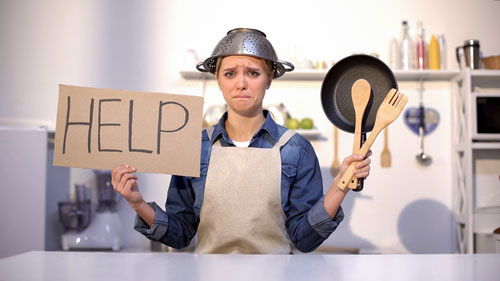This is the number one rule of healthy eating…
Avoid processed foods.
They are often full of dangerous chemicals, sugar, and trans fats. And they’re linked to cancer, heart disease, diabetes, Alzheimer’s, and many other serious conditions.[i] [ii]
Cooking at home using whole foods is a much healthier way to go. But it’s easy to fall into cooking habits that can undermine your efforts, making your homemade food as unhealthy as junk food.
Never Do This in Your Kitchen
Here are six food preparation practices you should throw in the trash:
- Piling on the sugar. Gary Taubes, author of the best-selling exposé The Case Against Sugar, says the sweet substance is nothing less than a toxin. And science backs him up. Studies link regular sugar consumption to cancer, heart disease, Alzheimer’s, and diabetes.[iii]
Don’t use artificial sweeteners, either. They carry their own set of health risks. Instead, choose a natural sugar substitute such as stevia or monk fruit drops.
- Thawing food on the counter. Bacteria multiply quickly at room temperature, contaminating your food. The USDA suggests you plan ahead and thaw raw or cooked meat, poultry, egg products, or any perishable foods in your refrigerator. If you are pressed for time, use your microwave.[iv]
- Using nonstick cookware. These pots and pans use chemicals such as perfluorooctanoic acid (PFOA) and per- and polyfluoroalkyl substances (PFAS). The EPA has linked them to diseases of the blood, liver, kidneys, and the immune system.[v]
The following types of cookware materials won’t harm your health: cast iron, enamel-covered cast iron, ceramic, stoneware, stainless steel, and glass.
- Washing meat or poultry. This doesn’t do anything to make the food cleaner or safer to eat. All it does it spread bacteria to your sink and hands. And splashing water droplets can transport the bugs to your counter. All of this increases the risk of contamination. Making sure meat and poultry are cooked thoroughly is the best thing you can do to kill bacteria.
- Charring meat. Nutrition Professor Christen Cupples Cooper warns against cooking meats above 300 degrees F. (This usually happens with grilling or pan frying.) This creates compounds called polycyclic aromatic hydrocarbons (HCAs) and heterocyclic amines (HCAs). Research shows that consuming these compounds “may activate enzymes linked to cancer risk,” said Professor Cooper.
She said you should avoid “cooking foods for any length of time over an open flame or hot metal surface.” Also, turn meat “frequently during cooking, and cut away charred portions.”[vi]
- Keeping leftovers in plastic containers. These often contain chemicals such as bisphenol A (BPA), bisphenol S (BPS), bisphenol F (BPF) and polyethylene terephthalate (PET). BPA, BPF, and BPS are linked to cancer, heart disease, diabetes, hormone problems, and migraines.[vii]
PET was supposed to be a new safer substitute for those chemicals, but research shows it leaches estrogenic compounds into food.
Estrogen is the primary female sex hormone. Exposure to excess estrogen in men leads to weight gain, ED, depression, and fatigue. In women, it can cause PMS symptoms, bloating, and insomnia.[viii] [ix]
Use glass containers for leftovers instead of plastic.
Home cooking is the healthiest way to eat…as long as you remember a few simple rules.
Editor’s Note: If you’re concerned about exposure to the toxic chemicals that are all around us, you need the Toxin Flush Protocol. It’s a detailed plan to help remove toxins from your system. It was published in Independent Healing, your best source for evidence-based health advice. Go HERE to subscribe.
Related Articles
One Food Helps You Make Up for a Lifetime of Health Mistakes
Simple Cooking Trick Lowers Blood Pressure
Every Time You Go Into a Store, You Walk Out With Toxic Waste
Like this Article? Forward this article here or Share on Facebook.
[i]https://www.medicalnewstoday.com/articles/325330
[ii] https://www.ncbi.nlm.nih.gov/pubmed/23657152
[iii]https://blog.usejournal.com/sugar-heart-disease-and-cancer-an-unsavory-story-of-wealth-versus-health-e3ee2cead203
[iv]https://www.fsis.usda.gov/wps/portal/fsis/topics/food-safety-education/get-answers/food-safety-fact-sheets/safe-food-handling/the-big-thaw-safe-defrosting-methods-for-consumers
[v]https://www.epa.gov/pfas/genx-and-pfbs-draft-toxicity-assessments
[vi]https://www.thehealthy.com/food/cooking-mistakes/
[vii]https://www.thehealthy.com/hydration/never-refill-plastic-water-bottles
[viii]https://www.medicalnewstoday.com/articles/323280.php
[ix]https://www.abc.net.au/science/articles/2009/04/29/2555698.htm

